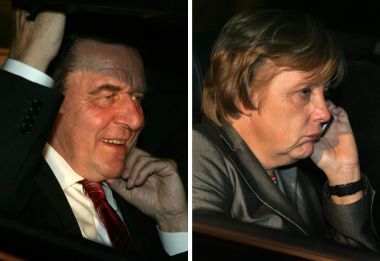|
Schroeder, Merkel delay resolving chancellor feud
(Reuters)
Updated: 2005-10-10 10:05
German Chancellor Gerhard Schroeder and conservative leader Angela Merkel
delayed resolving a bitter row over who should lead Germany after Sunday talks
to lay the basis for a coalition government of their rival parties.
Schroeder, Merkel and their chief allies, respectively Social Democrat (SPD)
chairman Franz Muentefering and Christian Social Union (CSU) leader Edmund
Stoiber, ended 3-1/2 hour discussions shortly before midnight without a word.
The government, the SPD and Merkel's Christian Democrats (CDU) declined to
comment.
Monday now appears to be the day when Germany's two biggest parties will
settle the chancellorship issue, opening the door to detailed talks about
forming a "grand coalition" of the two.
A meeting of the four party heavyweights is planned for Monday at 11 a.m.
(0900 GMT). They also plan consultative sessions with senior party members
before and afterwards.
Analysts predict they will eventually strike a deal vaulting Merkel into the
chancellery and giving the SPD key ministerial posts.
Wolfgang Schaeuble, deputy parliamentary leader of the conservatives, told
reporters on Sunday that the conservatives would walk away from the table if
Schroeder did not give way.

A combination of two pictures shows Germany's
Christian Democratic Union (CDU) leader Angela Merkel (R) and German
Chancellor Gerhard Schroeder in their limousines after they left talks
between Germany's conservative (CDU/CSU) parties and the Social Democrats
in Berlin October 9, 2005. Schroeder and conservative leader Angela Merkel
delayed resolving a bitter row over who should lead Germany after Sunday
talks to lay the basis for a coalition government of their rival parties.
[Reuters] | "I think Schroeder has understood that
he will not remain federal chancellor," Schaeuble said.
Three weeks after an election which gave neither Merkel's Christian Democrats
(CDU) nor Schroeder's SPD enough votes to rule with their allies, coalition
talks might then finally start. They are likely to drag into November.
POLITICAL LIMBO
The conservatives won four more parliamentary seats than the SPD in last
month's election but Schroeder has refused to step aside, plunging Germany into
political uncertainty that economists say could further damage its ailing
economy.
Germany's gross domestic product ( GDP) is expected to grow a mere one
percent this year, the weakest in the 25-nation European Union. Unemployment hit
a post-war high of more than 5.2 million people in February.
Financial markets have been watching the talks closely to see how far Merkel,
seen as a keen advocate of structural change, will have to water down her reform
agenda to appease the SPD and secure the chancellorship.
If Merkel makes too many concessions it could delay or scupper some of the
changes Germany urgently needs to boost its growth rate, financial analysts say.
The two sides have already sketched out areas where they should be able to
work together, including cutting Germany's ballooning budget deficit and
reforming the tangle of state and federal powers that has crippled
decision-making in the past.
SHARED CABINET POSTS
German media, citing CDU sources, said on Saturday that Merkel wants a deal
under which she would be chancellor, with her party sharing half the posts in a
16-member cabinet with the SPD.
SPD and CDU spokesmen both declined to comment and noted that Merkel,
Stoiber, Schroeder and Muentefering had agreed not to reveal details of the
talks before they end.
Bild am Sonntag newspaper reported on Sunday, without citing any sources,
that Schroeder could become foreign minister and vice-chancellor in a Merkel-led
cabinet.
|